While funeral pyres are common in places like India, the practice of open-air cremation is still very rare in the United States. Yet there has been a shift towards non-traditional burial methods. In the small town of Crestone, CO, Stephanie Gaines and the Crestone End-of-Life Project (CEOLP) have constructed a permanent legal open-air cremation site in the mountains to serve their community. I spoke with Stephanie about CEOLP and their innovative site, which has been garnering media attention across the nation.
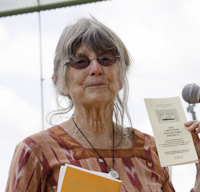
Liz: First off, could you tell us a bit about the Crestone End-of-Life Project? How did you get started?
Stephanie: Crestone is a unique community in an isolated part of southern Colorado. Within it, there are a number of practiced communities, including several Zen Buddhist centers and Tibetan Buddhist centers. We arose because members of the community were following their own traditions and doing open-air cremations on their land. In fact, from 1988 until 2006, cremations in Crestone were mostly being done by individual groups. So we began to work to bring this practice into a more stable situation.
We were donated land by the Dragon Mountain Temple, which is a very beautiful retreat center here in Crestone. We went through a process with the Department of Health and Environment, who checked out the site and gave their approval. After that we went through a process with the local property owner’s association and the planning board. Then we were granted our first Conditional Use Permit.
Liz: What did you hope to accomplish with this project?
Stephanie: We wanted to be a service to the community, and we felt people should be trained, and should have a permanent legal cremation site. My vision was that we needed to educate the community and ourselves. To that end we did all kinds of training: how to fill out directives, how to fill out death certificates, how to care for the body, how to support the family. We wanted to train everyone, and we wanted the cremation site to remain an interfaith site.
Liz: Who can elect to be cremated at the Crestone open-air site?
Stephanie: We are restricted to our own community. For environmental reasons, we don’t cremate embalmed bodies, and bodies that are transported across state lines are generally required to be embalmed. Beyond that, we are an interfaith site. We’ve performed cremations for all different spiritual communities: elderly Christian ladies, a Native American elder, the father of two Catholic nuns. Each ceremony is really just a reflection of the individual. We’ll have a Muslim call to prayer, or the Kaddish will be recited, or there will be Buddhist traditions. Some are elaborate and some are profoundly simple.
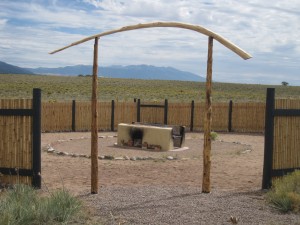
The Crestone open-air cremation site
As it is, we are the only cremation site of this kind in the country. There is another open-air cremation site at a Buddhist temple in Red Feather Lakes, CO, but it only conducts cremations for its members.
Liz: Despite the fact that CEOLP only offers cremation at its site to the Crestone community, has the project generated outside interest and inquiries?
Stephanie: The interest from outside of Crestone has been tremendous. In January, there was an article about us in the Washington Times. The journalist was actually just present at one of our meetings, and there happened to be a cremation the next day. After that, we received 3,000 hits on our website, and people were calling us from all over the country. There have even been military members, people who were going off to Afghanistan who knew that if they died they didn’t want to be buried in Arlington Cemetery and have a military ceremony. They wanted something special for their families.
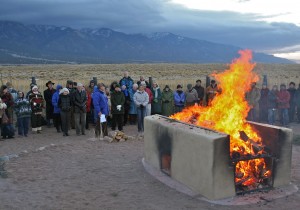
A cremation at the Crestone site
Liz: How has the Crestone community received the CEOLP’s open-air cremation site?
Stephanie: To begin the process, I held a public meeting in the fall of 2005, and we began to circulate petitions for community support at fairs, the post office, etc. We had phenomenal support from our community. The only people who were concerned about us were the residents whose land somewhat adjoined the site, though they were more than a quarter mile away. At first they argued with us, but we responded to every item on their agenda. They are now our friends. That kind of response was really good at enabling us to have more clarity. We always say that people who resist us are our greatest teachers.
Liz: Can you describe what the experience of the cremation ceremony is like, particularly for the families?
Stephanie: Many people in Crestone have family living elsewhere, and when they hear about their loved one’s advance directive for open-air cremation, they’re usually horrified. One thing we stipulate is that people should discuss their choice with their family. We encourage family members to call us with questions. We try to keep the person’s final days calm and mindful, and we want that to continue after death.
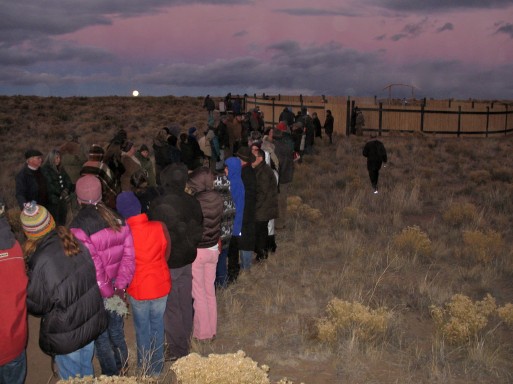
The procession path to the cremation site
We’ve had many people attend the ceremony with some apprehension, and leave transformed by the sacred experience. It’s a profound awakening for family members, to witness the transformation, the nature of that person emerging and radiating, especially if they had been suffering. The ceremony is very beautiful, a whole ritual. We greet guests as they come and give them juniper. The body arrives with everyone lined up on either side of the pathway. There is a procession up to the site, circumambulating the pyre. The whole thing is so beautiful, in this beautiful site looking at the mountains. Just witnessing, being present and witnessing, is so transformative for people. Witnessing in itself becomes a support.
Liz: What advice would you give our SevenPonds readers who are preparing for their own end-of-life?
Stephanie: Our educational branch stresses the importance of completing one’s advance directives. We all know we’ll die, but we don’t know when. It’s very important to have a dialogue with family and friends as well. On the other side of that, and this is what SevenPonds helps with, I think people should start forming groups that are prepared to serve one another: groups who know how to care for the body, who know how to get the materials you’ll need, who will train each other, who know how to fill out a death certificate if you plan to have a home funeral. Educate yourself and come together in a group to serve each other and prepare for the most important transition of our lives. It’s so beautiful if there’s a community of people, people who love you, who are prepared and able to serve you in a mindful and competent way.
 Liz: Thank you so much, Stephanie, for this enlightening conversation!
Liz: Thank you so much, Stephanie, for this enlightening conversation!

 An Interview with Stephanie Gaines: Part One
An Interview with Stephanie Gaines: Part One


 Support Healthy Aging By Maintaining Balance — On One Leg
Support Healthy Aging By Maintaining Balance — On One Leg
 “Wild Geese” by Mary Oliver
“Wild Geese” by Mary Oliver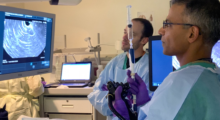
















This is my first time pay a quick visit at here
and i am genuinely impressed to read all at single place.
Report this comment